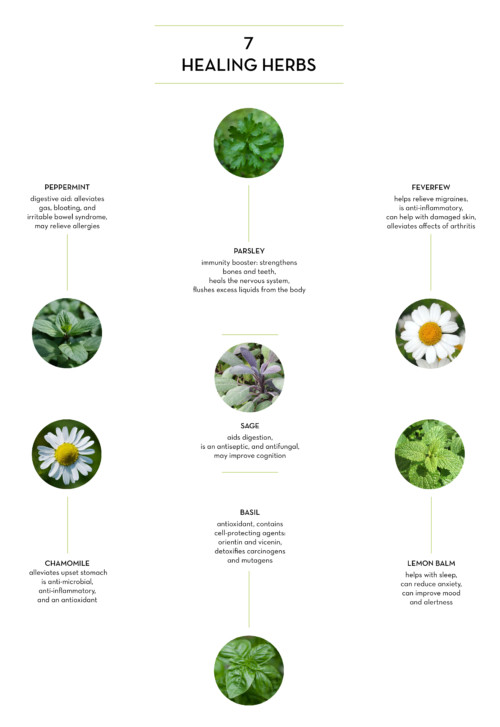The Best and Most Common Healing Herbs
Move over, Aspirin: there’s a new crop of non-invasive medicinal plants in town. Here’s how to heal yourself with common herbs you probably already have at home:
Parsley
Parsley is a known immunity booster that has a surprisingly felicitous effect on bones and teeth: it helps strengthen both. The plant (Petroselinum crispum) also heals the nervous system and helps flush excess fluid from the body, thus regulating the adrenals while supporting kidney function. Regular doses of parsley (which in this case means eating parsley regularly) can also help control blood pressure.
Chamomile
Long-admired for its soothing effects on the body (it alleviates upset stomachs by lowering gastric acidity) and the mind (a favorite nighttime tonic for the restless among us), chamomile’s antimicrobial, anti-inflammatory, and antioxidant properties also support the recovery of superficial skin wounds. Instead of rushing for the Neosporin, try using a chamomile tea to wash off small cuts and scrapes.
Basil
A potent antioxidant, basil contains orientin and vicenin, both of which protect cells by preventing damage from radiation and free radicals. Basil also detoxifies carcinogens and mutagens, having shown particular promise in inhibiting early-stage stomach and skin cancers. Basil oil helps upset stomachs by relaxing the smooth muscle along the intestines and dilating small blood vessels. (We also use its muscle-relaxing properties to treat headaches.)
Feverfew
A boon for those suffering from migraines, feverfew contains parthenolide, a chemical that decreases the factors responsible for the onset of headaches. Its anti-inflammatory properties can help with damaged skin, while it’s also shown some promise in alleviating the painful effects of arthritis.
Lemon Balm
Besides attracting bees to your yard, lemon balm can help you catch some zzz’s: taken in conjunction with other soothing plants (like chamomile), lemon balm can reduce anxiety and encourage a sound night’s sleep. During your waking hours, lemon balm can also improve mood and alertness. Try steeping a tablespoon in hot water in the morning or the night before a stressful day ahead.
Sage
Adding sage to your diet is a wise idea. The tasty herb aids digestion, is an antiseptic and antifungal, and can sooth a nasty cough when prepared in a tea with echinacea. Sage has shown promising results in improving cognition among patients with dementia– it also contains estrogen, and can be helpful in mitigating the effects of menopause, especially hot flashes. (Our favorite way to eat sage is typically in a pineapple smoothie.)
Peppermint
Peppermint is a legendary digestive aid– by relaxing smooth muscle, the plant can alleviate gas, bloating, and even chronic irritable bowel syndrome. The next time you’re digging into a rich meal, try drinking a cup of peppermint tea half an hour before the first course. A few drops of the essential oil can also help relieve the symptoms of allergies (peppermint is an expectorant and antispasmodic that can keep you from coughing), so carry a small bottle in your bag if you plan to be outdoors.



































